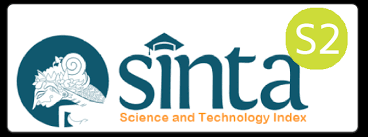Analysis of Metacognition Ability to Solve Mathematics Problem
Abstract
In this study, two components of metacognition were examined, namely metacognitive knowledge and metacognitive skills. This study aims to analyse the students’ metacognitive abilities based on predetermined indicators, by looking at the relationship between the performance of metacognition knowledge and metacognition skill. The study discovers that the students with low, medium, and high scores perform differently. The conclusion is that students who have metacognition knowledge do not necessarily have metacognition skills or abilities.
Keywords
Full Text:
PDFReferences
Amin, I., & Sukestiyarno, Y. L. (2015). Analysis metacognitive skills on learning mathematics in high school. International Journal of Education and Research, 3(3), 213–222. http://www.ijern.com/journal/2015/March-2015/18.pdf
Anderson, L. W., & Krathwohl, D. R. (2021). A taxonomy for learning, teaching, and assessing: A revision of Bloom's taxonomy of educational objectives. Longman.
Baker, L., & Brown, A. L. (2001). A Taxonomy for learning, teaching, and assessing (A Revision of Bloom’s taxonomy of educational objectives). In Handbook of Reading Research. Bolt Beranek and Newman, Inc.
Blummer, B., & Kenton, J. M. (2014). Improving student information search. Chandos Publishing. https://doi.org/10.1533/9781780634623.33
Brookhart, S. M., & Nitko, A. J. (2013). Educational assessment of students: Pearson new international edition. British Library Cataloguing-in-Publication Data.
Conley, D. (2014). Learning strategies as metacognitive factors: A critical review. Eugene, OR: Educational Policy Improvement Center.
Efklides, A. (2009). The role of metacognitive experiences in the learning process. Psicothema, 21(1), 76–82.
Flavell, J. H. (1979). Metacognition and cognitive monitoring: A new area of cognitive-developmental inquiry. American Psychologist, 34(10), 906–911. https://doi.org/10.1037/0003-066X.34.10.906
Hacker, D. J., Dunlosky, J., & Graesser, A. C. (Eds.). (2009). Handbook of metacognition in education. Routledge. https://doi.org/10.4324/9780203876428
Hartman, H. J. (Ed.). (2001). Metacognition in learning and instruction: Theory, research and practice (Vol. 19). Springer Science & Business Media.
Izzati, L. R., & Mahmudi, A. (2019). Analysis of metacognition skills of students in junior high school based on cognitive style. Journal of Physics: Conference Series, 1157(3). https://doi.org/10.1088/1742-6596/1157/3/032089
Larkin, S. (2006). Collaborative group work and individual development of metacognition in the early years. Research in science education, 36, 7-27.
Lestari, W., Pratama, L. D., & Jailani, J. (2019). Metacognitive skills in mathematics problem solving. Jurnal Daya Matematis, 6(3), 286-295. https://doi.org/10.26858/jds.v6i3.8537
National Research Council. 2005. How Students Learn: Science in the Classroom. Washington, DC: The National Academies Press. https://doi.org/10.17226/11102.
Ovan, Waluya, S. B., & Nugroho, S. E. (2018). Analysis mathematical literacy skills in terms of the students’ metacognition on PISA-CPS model. Journal of Physics: Conference Series, 983(1). https://doi.org/10.1088/1742-6596/983/1/012151
Purnomo, D., Nusantara, T., Subanji, S., & Rahardjo, S. (2017). The characteristic of the process of students’ metacognition in solving calculus problems. International Education Studies, 10(5), 13-25. https://doi.org/10.5539/ies.v10n5p13
Rahmah, N. (2018). Hakikat pendidikan matematika. Al-Khwarizmi: Jurnal Pendidikan Matematika dan Ilmu Pengetahuan Alam, 1(2), 1–10. https://doi.org/10.24256/jpmipa.v1i2.88
Rickheit, G. & Strohner, H. (1998). Cognitive systems theory. In G. Altmann & W. Koch (Ed.), Systems: New Paradigms for the Human Sciences (pp. 404-420). Berlin, New York: De Gruyter. https://doi.org/10.1515/9783110801194.404
Veenman, M. V. J., Wilhelm, P., & Beishuizen, J. J. (2004). The relation between intellectual and metacognitive skills from a developmental perspective. Learning and Instruction, 14(1), 89–109. https://doi.org/10.1016/j.learninstruc.2003.10.004
Walle, J. A. Van de, S.Karp, K., Bay-Williams, J. M., Wray, J., & Brown, E. T. (2019). Elementary and Middle School Mathematics: Teaching Developmentally. Pearson
DOI: https://doi.org/10.46517/seamej.v13i1.183
Refbacks
Indexed by:
Southeast Asian Mathematics Education Journal
SEAMEO Regional Centre for QITEP in Mathematics
Jl. Kaliurang Km 6, Sambisari, Condongcatur, Depok, Sleman
Yogyakarta, Indonesia
Telp. +62 274 889955
Email: seamej@qitepinmath.org
p-ISSN: 2089-4716 | e-ISSN: 2721-8546
Southeast Asian Mathematics Education Journal is licensed under a Creative Commons Attribution 4.0 International License
View My Stats
Supported by:




